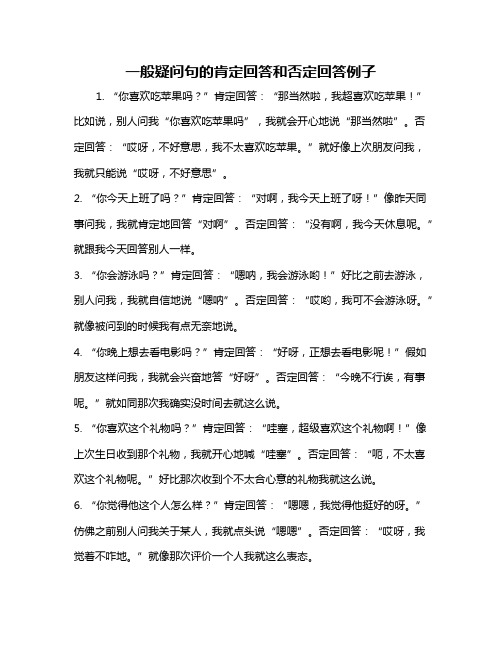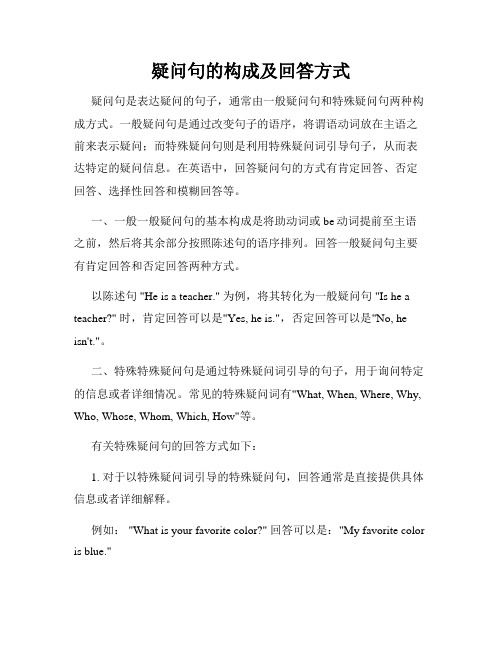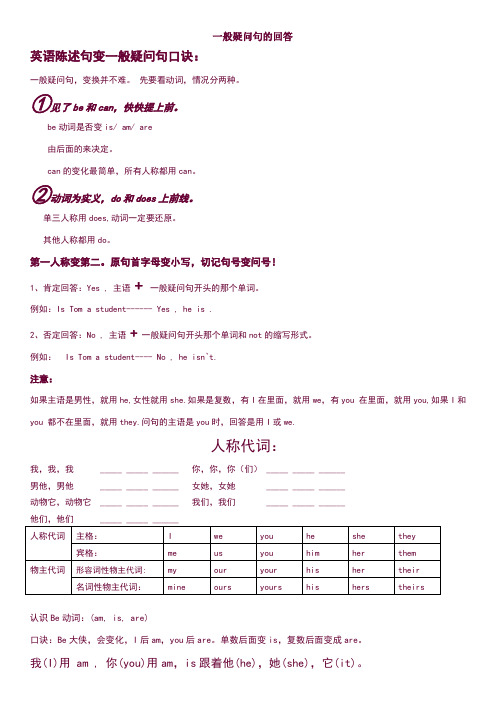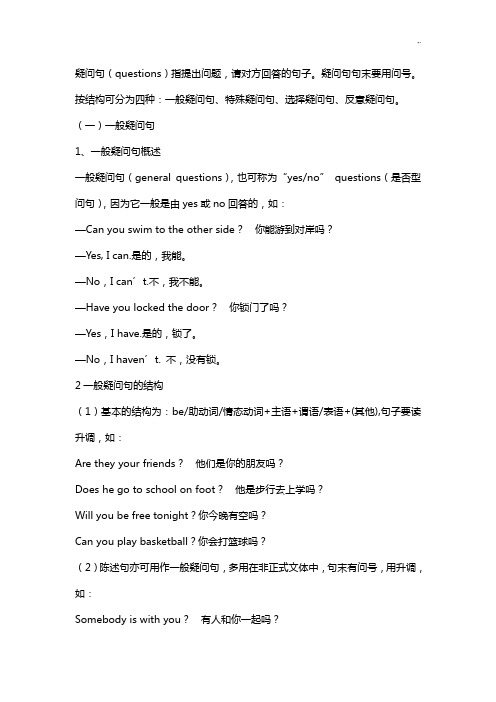有一般疑问句及回答方式
一般疑问句的肯定回答和否定回答例子

一般疑问句的肯定回答和否定回答例子1. “你喜欢吃苹果吗?”肯定回答:“那当然啦,我超喜欢吃苹果!”比如说,别人问我“你喜欢吃苹果吗”,我就会开心地说“那当然啦”。
否定回答:“哎呀,不好意思,我不太喜欢吃苹果。
”就好像上次朋友问我,我就只能说“哎呀,不好意思”。
2. “你今天上班了吗?”肯定回答:“对啊,我今天上班了呀!”像昨天同事问我,我就肯定地回答“对啊”。
否定回答:“没有啊,我今天休息呢。
”就跟我今天回答别人一样。
3. “你会游泳吗?”肯定回答:“嗯呐,我会游泳哟!”好比之前去游泳,别人问我,我就自信地说“嗯呐”。
否定回答:“哎哟,我可不会游泳呀。
”就像被问到的时候我有点无奈地说。
4. “你晚上想去看电影吗?”肯定回答:“好呀,正想去看电影呢!”假如朋友这样问我,我就会兴奋地答“好呀”。
否定回答:“今晚不行诶,有事呢。
”就如同那次我确实没时间去就这么说。
5. “你喜欢这个礼物吗?”肯定回答:“哇塞,超级喜欢这个礼物啊!”像上次生日收到那个礼物,我就开心地喊“哇塞”。
否定回答:“呃,不太喜欢这个礼物呢。
”好比那次收到个不太合心意的礼物我就这么说。
6. “你觉得他这个人怎么样?”肯定回答:“嗯嗯,我觉得他挺好的呀。
”仿佛之前别人问我关于某人,我就点头说“嗯嗯”。
否定回答:“哎呀,我觉着不咋地。
”就像那次评价一个人我就这么表态。
7. “你能帮我一下吗?”肯定回答:“行啊,没问题,我来帮你!”上次有人这么问我,我就爽快地说“行啊”。
否定回答:“不好意思哈,这会儿没空呢。
”就和那次我有些为难时说的一样。
8. “你养狗了吗?”肯定回答:“养啦,我养了一只超可爱的狗!”就像别人好奇问我时我骄傲地说。
否定回答:“没养呀,还没这个打算呢。
”好像那次我就是这么回应的。
我的观点结论就是:一般疑问句的回答真的很简单直接,有时候一句话就能表达清楚我们的态度和情况呢!。
小学英语特殊疑问句和一般疑问句地归纳

特殊疑问句和一般疑问句的答法一般疑问句通常都是 1..以be (am,is,are,)开头2.以Do,Does,Did 开头或以Can开头回答方法:前面用什么提问的就用什么答。
只有两种回答方式:1)肯定的, Yes,主语 + 提问词.2)否定的 No,主语+提问词+not.【注意:问句与答句的第一二人称要互换】如:④主语是名字时的答语:看性别,男的用he ,女的用she ,其他的用it 复数就用they。
如:①Is she……? Is he………? Is it……..?Yes, she is. Yes, he is. Yes, it is.No, she isn,t. No, he isn,t. No, it isn,t.②Are they………? Are the monkeys …….?Yes, they are. Yes, they are.No,they aren’t No,they aren’t③ Do they………? Does he……..? Did she…….?Yes,they do. Yes,he does. Yes, she did.No,they don’t. No,he doesn’t. No,she didn’t.④Are you……..? Are you……..? Do you…….?Yes, I am. Yes, we are. Yes ,I do. 或 Yes,No, I am not. No, we aren’t. No,I don’t. 或No,⑤Does Mike…….? Is ChenJi…..? Do your parents…?Yes ,he does. Yes , she is. Yes, they do.No,he doesn’t. No, she isn’t. No,they don’t.一、专项练习。
1. Did ChenJie read books yesterday?2. Can the girl cook the meals ?—————————————————————————————3.Is he going to swim this afternoon?4. Are they going to take a trip next weend? ————————————————————————————————5.Does he often go to school by bike ? 6. Do you play basketball every weekend? ———————————————————————————————————7. Did Mike do his homework yesterday? 8. Are they playing basketball now?————————————————————————————————一般疑问句及特殊疑问句的总结一般疑问句的定义:用yes或no来回答的疑问句叫一般疑问句。
疑问句的构成及回答方式

疑问句的构成及回答方式疑问句是表达疑问的句子,通常由一般疑问句和特殊疑问句两种构成方式。
一般疑问句是通过改变句子的语序,将谓语动词放在主语之前来表示疑问;而特殊疑问句则是利用特殊疑问词引导句子,从而表达特定的疑问信息。
在英语中,回答疑问句的方式有肯定回答、否定回答、选择性回答和模糊回答等。
一、一般一般疑问句的基本构成是将助动词或be动词提前至主语之前,然后将其余部分按照陈述句的语序排列。
回答一般疑问句主要有肯定回答和否定回答两种方式。
以陈述句 "He is a teacher." 为例,将其转化为一般疑问句 "Is he a teacher?" 时,肯定回答可以是"Yes, he is.",否定回答可以是"No, he isn't."。
二、特殊特殊疑问句是通过特殊疑问词引导的句子,用于询问特定的信息或者详细情况。
常见的特殊疑问词有"What, When, Where, Why, Who, Whose, Whom, Which, How"等。
有关特殊疑问句的回答方式如下:1. 对于以特殊疑问词引导的特殊疑问句,回答通常是直接提供具体信息或者详细解释。
例如: "What is your favorite color?" 回答可以是:"My favorite color is blue."2. 对于以"yes/no"形式回答的特殊疑问句,回答可以是简单的"Yes"或"No"。
例如: "Do you like ice cream?" 回答可以是:"Yes, I do." 或 "No, I don't."3. 对于以"How"开头的特殊疑问句,回答通常需要提供具体细节或者程度描述。
一般疑问句的回答

一般疑问句的回答英语陈述句变一般疑问句口诀:一般疑问句,变换并不难。
先要看动词,情况分两种。
①见了be和can,快快提上前。
be动词是否变is/ am/ are由后面的来决定。
can的变化最简单,所有人称都用can。
②动词为实义,do和does上前线。
单三人称用does,动词一定要还原。
其他人称都用do。
第一人称变第二。
原句首字母变小写,切记句号变问号!1、肯定回答:Yes , 主语+ 一般疑问句开头的那个单词。
例如:Is Tom a student------ Yes , he is .2、否定回答:No , 主语+一般疑问句开头那个单词和not的缩写形式。
例如: Is Tom a student---- No , he isn`t.注意:如果主语是男性,就用he,女性就用she.如果是复数,有I在里面,就用we,有you 在里面,就用you,如果I和you 都不在里面,就用they.问句的主语是you时,回答是用I或we.人称代词:我,我,我 _____ _____ ______ 你,你,你(们) _____ _____ ______男他,男他 _____ _____ ______ 女她,女她 _____ _____ ______动物它,动物它 _____ _____ ______ 我们,我们 _____ _____ ______他们,他们 _____ _____ ______认识Be动词:(am, is, are)口诀:Be大侠,会变化,I后am,you后are。
单数后面变is,复数后面变成are。
我(I)用 am , 你(you)用am,is跟着他(he),她(she),它(it)。
单数名词用is,复数名词全用are。
变否定,更容易,be后not加上去。
变疑问,往前提,句末问号莫丢弃。
还有一条须注意,句首大写莫忘记。
一般疑问句,特殊疑问句,选择疑问句,反义疑问句的详细用法

疑问句(questions)指提出问题,请对方回答的句子。
疑问句句末要用问号。
按结构可分为四种:一般疑问句、特殊疑问句、选择疑问句、反意疑问句。
(一)一般疑问句1、一般疑问句概述一般疑问句(general questions),也可称为“yes/no”questions(是否型问句),因为它一般是由yes或no回答的,如:—Can you swim to the other side?你能游到对岸吗?—Yes, I can.是的,我能。
—No,I can’t.不,我不能。
—Have you locked the door?你锁门了吗?—Yes,I have.是的,锁了。
—No,I haven’t. 不,没有锁。
2一般疑问句的结构(1)基本的结构为:be/助动词/情态动词+主语+谓语/表语+(其他),句子要读升调,如:Are they your friends?他们是你的朋友吗?Does he go to school on foot?他是步行去上学吗?Will you be free tonight?你今晚有空吗?Can you play basketball?你会打篮球吗?(2)陈述句亦可用作一般疑问句,多用在非正式文体中,句末有问号,用升调,如:Somebody is with you?有人和你一起吗?He didn’t finish the work?他没有做完活吗?You are fresh from America,I suppose?我猜,你刚从美国回来吧?3、一般疑问句的答语(1)一般疑问句一般由yes或no来回答,如:—Are you tired?你累了吗?—Yes,I am.是的,累了。
—No, I’m not.不,不累。
—Does she do the cleaning?她扫除了吗?—Yes ,she does.是的,她打扫了。
—No,she doesn’t.不,她没打扫。
(2)回答一般疑问句除了用yes或no外,也可用certainly,probably,perhaps,of course,all right,with pleasure等代替yes,用never,not at all等代替no,如:—Can you help me?你能帮个忙吗?—Certainly.当然。
小学英语特殊疑问句和一般疑问句的归纳

特殊疑问句和一般疑问句的答法一般疑问句通常都是1..以be (am,is,are,)开头2.以Do,Does,Did 开头或以Can开头回答方法:前面用什么提问的就用什么答。
只有两种回答方式:1)肯定的,Yes,主语+ 提问词.2)否定的No,主语+提问词+not.【注意:问句与答句的第一二人称要互换】如:④主语是名字时的答语:看性别,男的用he ,女的用she ,其他的用it 复数就用they。
如:①Is she……? Is he………? Is it……..?Yes, she is.Yes, he is. Yes, it is.No, she isn,t. No, he isn,t. No, it isn,t.②Are they………? Are the monkeys …….?Yes, they are.Yes, they are.No,they aren’t No,they aren’t③Do they………?Does he……..? Did she…….?Yes,they do. Yes,he does. Yes, she did.No,they don’t. No,he doesn’t. No,she didn’t.④Are you……..?Are you……..? Do you…….?Yes, I am.Yes, we are. Yes ,I do. 或Yes,No, I am not. No, we aren’t. No,I don’t. 或No,⑤Does Mike…….? Is ChenJi…..? Do your parents…?Yes ,he does.Yes , she is. Yes, they do.No,he doesn’t. No, she isn’t. No,they don’t.一、专项练习。
1. Did ChenJie read books yesterday?2. Can the girl cook the meals ?—————————————————————————————3.Is he going to swim this afternoon?4. Are they going to take a trip next weend? ————————————————————————————————5.Does he often go to school by bike ? 6. Do you play basketball every weekend? ———————————————————————————————————7. Did Mike do his homework yesterday? 8. Are they playing basketball now?————————————————————————————————一般疑问句及特殊疑问句的总结一般疑问句的定义:用yes或no来回答的疑问句叫一般疑问句。
小学英语特殊疑问句和一般疑问句的归纳

特殊疑问句和一般疑问句的答法一般疑问句通常都是 1..以be (am,is,are,)开头2.以Do,Does,Did 开头或以Can开头回答方法:前面用什么提问的就用什么答。
只有两种回答方式:1)肯定的, Yes,主语 + 提问词.2)否定的 No,主语+提问词+not.【注意:问句与答句的第一二人称要互换】如:④主语是名字时的答语:看性别,男的用he ,女的用she ,其他的用it 复数就用they。
如:①Is she…… Is he……… Is it……..Yes, she is. Yes, he is. Yes, it is.No, she isn,t. No, he isn,t. No, it isn,t.②Are they……… Are the monkeys …….Yes, they are. Yes, they are.No,they aren’t No,they aren’t③ Do they……… Does he…….. Did she…….Yes,they do. Yes,he does. Yes, she did.No,they don’t. No,he doesn’t. No,she didn’t.④Are you…….. Are you…….. Do you…….Yes, I am. Yes, we are. Yes ,I do. 或 Yes,No, I am not. No, we aren’t. No,I don’t. 或No,⑤Does Mike……. Is ChenJi….. Do your parents…Yes ,he does. Yes , she is. Yes, they do.No,he doesn’t. No, she isn’t. No,they don’t.111v1.0 可编辑可修改一、专项练习。
1. Did ChenJie read books yesterday2. Can the girl cook the meals—————————————————————————————he going to swim this afternoon 4. Are they going to take a trip next weekend ————————————————————————————————5.Does he often go to school by bike 6. Do you play basketball every weekend ———————————————————————————————————7. Did Mike do his homework yesterday 8. Are they playing basketball now————————————————————————————————一般疑问句及特殊疑问句的总结一般疑问句的定义:用yes或no来回答的疑问句叫一般疑问句。
一般疑问句

1 简介一般疑问句是疑问句的一种。
它是只用yes(是)或no(否)来回答的句子。
其结构是:be/助动词/情态动词+主语+其他成分通常回答为:肯定:Yes,主语+提问的be/助动词/情态动词.否定:No,主语+提问的be/助动词/情态动词的否定形式.2英语中的一般疑问句在不同情况下,疑问句根据句子意思分为一般疑问句和特殊疑问句。
这里着重分析的是一般疑问句的用法,及在实际运用中遇到的一些状况。
A:一般疑问句:以be动词, have /has/do等助动词、can/may等情态动词开头,以yes或no来回答的问句。
它的基本结构是:Be/Have /Has/Did等助动词(包括情态动词)+主语+谓语(包括表语)+┄?回答常用简略回答。
1、谓语动词是be动词、助动词、情态动词时,只要直接把这些词置于句首,句末改成问号。
2、谓语动词是行为动词时,必须在句首加上助动词Do、Does(三单)、Did(过去式)加上这些助动词后,句子中谓语动词必须用原形。
注意:在把肯定句改成否定句或一般疑问句的时候,要注意句中是否有already、some、something、somebody等词,如果有也必须进行改变,already要改成yet,some、something、somebody等分别改成any、anything、anybody 等。
另外,在改成否定句的时候注意把too改成either, both改成neither, all改成none等.在改成一般疑问句的时候,常常把第一人称I、we改成第二人称you。
如:Are you from Japan?Yes, I am./ No, I'm not.Is her sister doing her homework now?Yes, she is./ No, she isn't.Does he work in a bank?Yes, he does./ No, he doesn't.Do you live near your school?Yes, I do./ No, I don't.Can you speak French?Yes, I can./ No, I can't.May I go home now?Yes, you may./ No, you mustn't.3、注意编辑1、将陈述句变为一般疑问句时,如句中有be 动词(am/ is/ are)时,可直接将它们提至主语前。
- 1、下载文档前请自行甄别文档内容的完整性,平台不提供额外的编辑、内容补充、找答案等附加服务。
- 2、"仅部分预览"的文档,不可在线预览部分如存在完整性等问题,可反馈申请退款(可完整预览的文档不适用该条件!)。
- 3、如文档侵犯您的权益,请联系客服反馈,我们会尽快为您处理(人工客服工作时间:9:00-18:30)。
有一般疑问句及回答方式
①助动词Do+主语+V原形...?
肯定回答: Yes,主语+do. 否定回答: No,主语+do not(don't).
Eg: Do you know the answer? Yes, we do. No, we don't.
②助动词Does+主语(第三人称单数)+V原形...?
肯定回答: Yes,主语+does. 否定回答: No,主语+doesn't.
Eg: Does he have a big house? Yes, he does. No, he doesn't.
③Am/Are/Is+主语...?
肯定回答: Yes,主语+am/are/is.
注意:Yes后面的I am, you are, he is, she is, it is不能缩写。
否定回答: No,主语+am/are/is+not.
(I'm not, you aren't或you're not, he isn't或he's not,she isn't或she's not, it isn't或it's not, we aren't或we're not)
Eg: Is he a baby? Yes, he is. No, he isn't.
④Is/Are there...?
肯定回答:Yes, there is/are. 否定回答:No, there is/are+not(isn't/aren't).
注意:Yes后面的there is, there are不能缩写。
Eg: Are there any books on the desk? Yes, there are. No, there aren't.
⑤情态动词+主语+V-原形...?
Eg: Could you tell me the way to Guangzhou Zoo, please?
May I go with you?。
